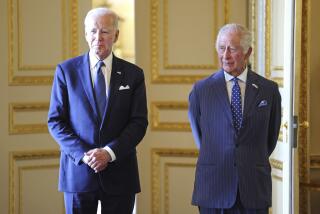Britain Repeats Role of Staunch U.S. Ally
- Share via
LONDON — Once again, Britain has played the role of the United States’ staunchest European ally by providing military and political support for U.S. strikes against Iraq.
While France questioned the move and Germany remained on the sidelines, Prime Minister Tony Blair said Britain played a “significant” role in Operation Desert Fox.
Blair appeared on TV minutes after Wednesday’s missile attack began--and before President Clinton made his statement--to defend the military action against Iraqi President Saddam Hussein.
“There is no realistic alternative to military force. . . . We have exhausted all other avenues,” Blair said in a statement delivered outside his Downing Street residence.
“Since the [Persian] Gulf War, the entire international community has worked to stop Saddam Hussein from keeping and developing nuclear, chemical and biological weapons and from continuing to threaten his neighbors,” Blair said.
“For the safety and stability of the region and the wider world, he cannot be allowed to do so,” he said. “If he will not, through reason and diplomacy, abandon his weapons of mass destruction program, it must be degraded and diminished by military force.”
British forces in the Persian Gulf region include 18 Tornado fighter-bombers and a frigate; additional warplanes are on standby in Turkey.
While Britain’s military support was useful, Blair’s primary contribution was to provide political cover so that the United States would not appear to be a solo aggressor against an Arab country.
Earlier Wednesday, Blair told the House of Commons that he believed the United States and Britain had the legal authority to launch the strikes without permission from the U.N. Security Council.
“Given Iraq’s manifest failure to cooperate over the last month, if we should choose to use force, we would have the necessary legal authority,” Blair declared at his weekly question-and-answer session.
On one level, Blair was simply playing the role that British governments have played since World War II--that of the loyal ally. But the Labor Party prime minister also has a variety of domestic and international reasons for taking a tough line against Hussein.
“Labor prime ministers always want to prove their mettle, that they are tough and [that] not just the Conservatives are strong on defense,” said Paul Rogers, an expert on international security issues and head of the Department of Peace Studies at the University of Bradford in Britain.
“On foreign policy, particularly on security issues, Blair has become quite conservative and anxious to prove his worth as an international power figure,” Rogers said.
Although there are questions about whether military strikes will resolve the crisis, there is public support in Britain for confronting the Iraqi leader. And Blair’s conservative opposition is not likely to challenge him on his stance. Leftists within his own party have already begun to call him to task for doing Clinton’s bidding.
Paul Beaver, a defense expert with Jane’s Defense Weekly, concurred that Blair is trying to flex his muscles in the international arena. “He is desperate to take on the mantle of junior policeman in the world, if the U.S. is the senior policeman,” Beaver said.
He added, however, that Britain can make valuable military contributions to an operation against Iraq.
“First of all, the Royal Air Force has a highly accurate position-guided bombing capability that the Americans don’t have,” Beaver said. “Secondly, they have after-action assessment. Reconnaissance capability. Americans do reconnaissance from space, Britain does it from 250 to 500 feet. There is a military reason for Britain to be there.”
Both Rogers and Beaver said that Blair feels a personal affinity with Clinton--an attachment he demonstrated earlier this year by appearing with Clinton at the United Nations while the president’s testimony in the Monica S. Lewinsky case appeared on television the same day.
“Blair feels quite a lot of debt to Clinton over Northern Ireland,” Rogers said. “He feels he owes Clinton quite a lot. Clinton has stood by him.”
The Northern Ireland peace process has been a centerpiece of Blair’s government. Clinton threw his weight behind the Good Friday peace agreement reached in April and has traveled to the region twice when the accord was faltering.
“At the end of the day, Bill Clinton is a mate,” Beaver said. “Blair believes he can help Clinton out of a hole globally.”
More to Read
Sign up for Essential California
The most important California stories and recommendations in your inbox every morning.
You may occasionally receive promotional content from the Los Angeles Times.










